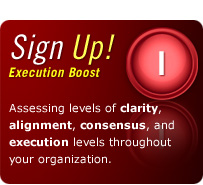January 28th, 2008
by Dr. Brian Higley |
One of my favorite areas of research is job and life satisfaction – and how business leaders can structure their team to be both profitable financially and to enhance the lives of the individuals making up the team at the same time. I recently came across some thoughts on the components of a satisfied life and thought I’d share some of my views on how these components can enhance both your life and your organization.
I was reading about a theory of life satisfaction that made the claim that, in essence, all people want 3 things from life: (1) to be, (2) to know and (3) to enjoy. As I thought about all of the journal articles I’ve read, experts I’ve spoken with, and experiences I’ve had in my 15 years in this field, this sounded like a pretty reasonable claim to me. So, I began to think a lot about these three categories and how they might relate to not only a better life, but also a better team and/or business.
(more…)
September 12th, 2007
by John Spence |
Now, let’s get clear at the start, I am not the world’s leading expert on sales nor do I claim to be. However, I will admit I did spend about 10 years where the main focus of my career was delivering very high-level sales training to Fortune 500 companies around the world and I have also read well over 200 books on sales, have listened to hundreds of hours of sales training CDs and attended dozens of sales training seminars — as well as having been the main sales person in my own company for more than 15 years. But there is still much to be learned!
So with all of that said, I wanted to send you along some comments and ideas… some things to think about, as you start your sales career.
(more…)
May 25th, 2007
by Dr. Brian Higley |
I talk a lot with our clients about SMART goals – Specific, Measurable, Agreed-upon, Realistic, and Time-bound steps toward fulfilling their strategic plans. I do this so frequently because my experience is that the best way to facilitate (and track) progress of strategic plans in meaningful and consistent ways is to develop SMART goals. Most people agree with me – and a few even attempt to set SMART goals once in awhile – but most of the time I find that people struggle with SMART goal development (even those who truly believe in their value and actually spend time attempting to set them).
For example, I recently had someone put forth the following as a SMART goal in one of our sessions: “treat every customer with respect – starting today.” I explained that although this is a very good idea (I certainly will never argue with treating all customers in a respectful way), it is an example of a very poor SMART goal. That is because it is neither Specific (“respect” could mean a firm handshake to me, but it might mean offering someone coffee every time they come into the office to you) nor Measurable (I can’t measure “respect” – on the other hand, I can measure, for example, how often someone shakes a hand or offers coffee).
(more…)
April 12th, 2007
by Dr. Brian Higley |
“Self-Mastery” is a concept that is repeatedly recommended as essential to leadership excellence. Our firm recently polled over 80 individuals – from CEO’s at a Fortune 500 level to high-functioning college students working at internships – on their opinions of their own levels of Self-Mastery. We found some very interesting results and wanted to share them in hopes of: (a) facilitating a robust conversation about Self-Mastery and (b) helping individuals conceptualize what Self-Mastery is, why it is so important, and how to move toward increasing it.
(more…)
September 8th, 2006
by Dr. Brian Higley |
I love to ask the big questions in life. And the biggest question that I’ve ever asked myself is this: “What does everybody (individuals and/or groups of people) want?” That is the question I asked myself in the late 1990’s as I was founding my company, The Building Blocks to Excllence, and being trained as a Ph.D. level behavioral scientist at the University of Florida. Since I was surrounded by so many brilliant business leaders and psychological minds at the time, I decided to start asking that question to these accomplished people to see if they could shed any light on the answer to my question.
The response I received from almost every one of them was that there is no single answer. “Everybody wants something different, Brian; there is no one answer to your question,” was their almost unanimous reply. However, I’m a stubborn person when it comes to answering big questions, so even though all of these incredibly bright people told me that my pursuit would be fruitless, I still felt like the answer may be out there. So I continued my quest of finding the answer to this enormous question.
I began the pursuit of this answer via a combination of powerful resources, beginning with my own personal experience, interviews with other knowledgeable people, and so called “common sense.” It soon became apparent that these resources would get me only so far, since as I’m sure you know, everybody has a different opinion regarding what everyone wants/needs more of — and many of these opinions can contrast with each other (e.g., “quitters never win” vs. “quit while you are ahead”, “birds of a feather flock together” vs. “opposites attract”). Thus, it became apparent that I had to go looking for my single answer somewhere else; I then decided to delve deep into the research literature to find the answer to my question.
(more…)


